This Mom From Spain Explained How Parents Adapt Kids To Their Schedule Instead Of The Other Way Around, And It Sounds Refreshing
With apps like TikTok around to introduce us to new perspectives from all over the world without leaving our home, I've learned more about the global differences in parenting than ever before. My mind was blown when BuzzFeed dove into the practice of Danish parents leaving their babies outside alone to sleep in strollers...
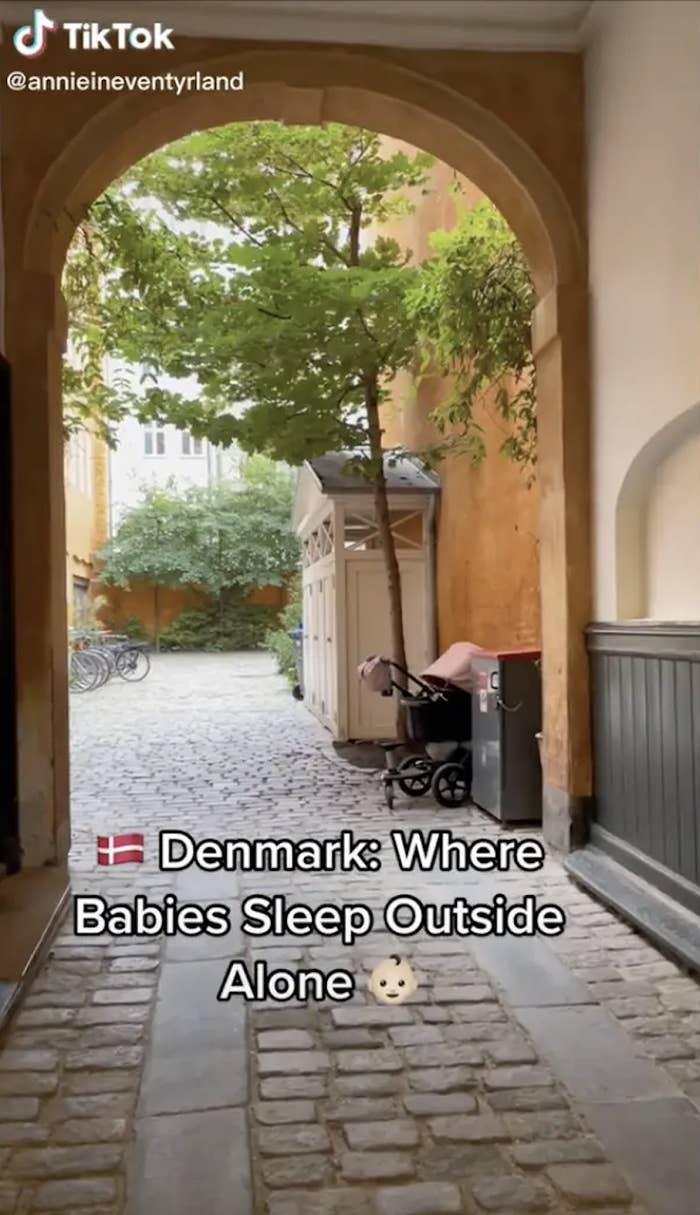
...and more recently, mom Ana Gildersleeve went viral when comparing how parenting differs in Spain — her home country of 18 years — and the US, where she's lived for the past 10 years.
@_anagildersleeve My thoughts on parenthood/motherhood in the U.S🇺🇸 vs Spain🇪🇸 #cultureshock #livingabroad #livingabroadwithkids #motherhoodjourney #mothethood #momsoftiktok #momlife #momtok #spain #usa #fypシ #learnontiktok
♬ original sound - Ana Gildersleeve
In the video, which has amassed over 2.2 million views on TikTok, Ana says: "I think being a parent in the US is way more boring and isolating than in Spain."
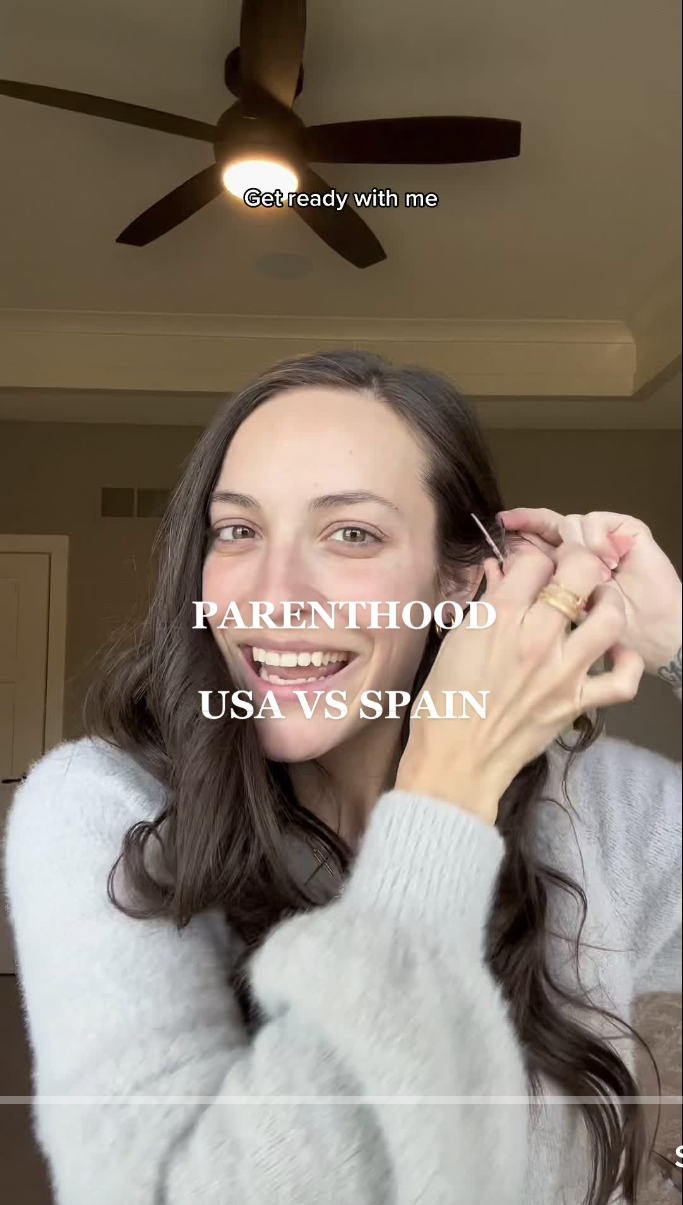
The mom of two was originally inspired to start this conversation after her family took a trip home to Spain and she ran into an American couple who had recently moved there. "We started to talk about the city and then about cultural differences, specifically parenting differences because they just had their second kid."
"They had their first kid in the US and their second kid in Spain, so they experienced being a parent in both countries. I told them that I had my first kid in the US and...that in my opinion, being a mother in the US is a little isolating because I wasn’t doing much during the week and that most Americans usually leave social activities for the weekend. That is when the wife said, 'I thought I was depressed, but I was just on the wrong country,' and that always stick with me."
This feeling of isolation is something Ana touches on heavily in her video. After having children in the US, she noticed that parents usually relegate their "fun time" to the weekend and dedicate their weekdays to work and parenting. "Monday through Friday, most Americans do not socialize with other people," Ana said. "They go straight home after work or, if you're a parent, after your kid's activities. In general, Americans save social events for the weekends. They spend a lot of time in the house."
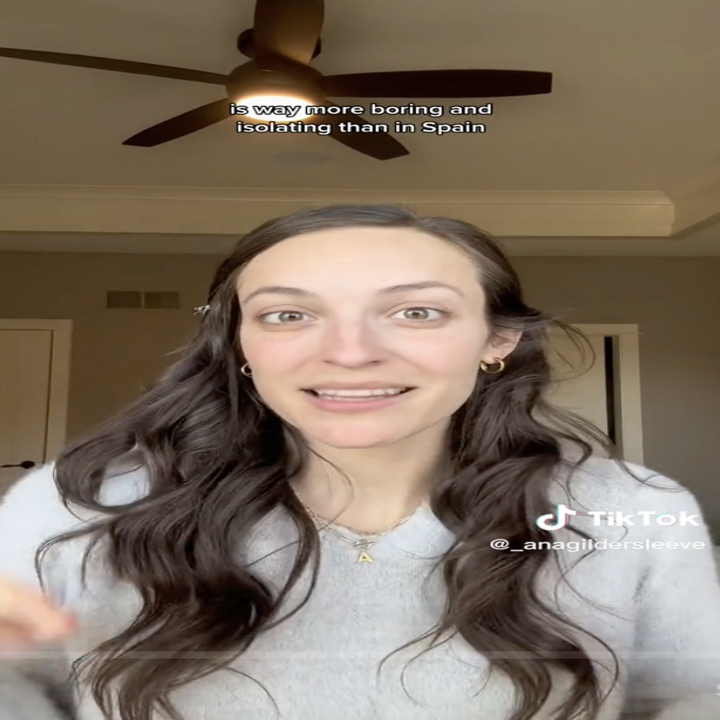
"In Spain, we're out all the time — Monday through Friday, Saturday and Sunday," she continued. "When the kids are done with school, you go to the closest playground to the school and socialize with other parents."
This is so common, she says, that playgrounds usually have a coffee shop or bar attached, and parents are often seen having a glass of wine with one another while watching the children play.
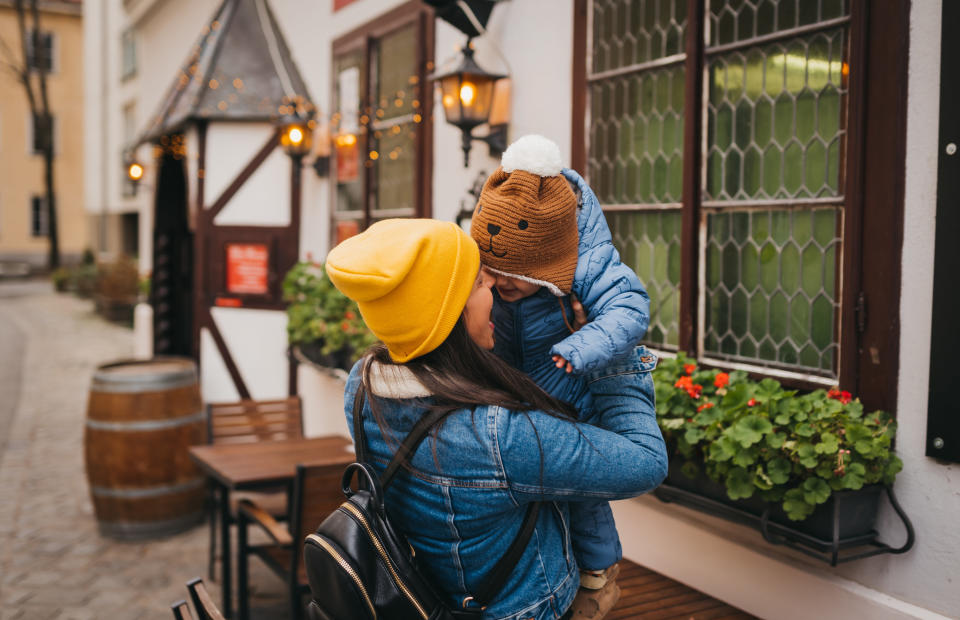
Ana also noticed that in the US, she's had to schedule playdates weeks or sometimes months in advance with other parents. But in Spain, she was able to send a quick text asking if another parent was available and, if so, they immediately scheduled a day in the park 20 minutes ahead of meeting time.

In terms of isolation, the 28-year-old said, "I feel like most Americans don't have a village at all. Moving around the country is pretty normal here, but in Spain most people live close to their families," which gives both parents and their babies easier access to their extended family.

And one of the biggest culture shocks came when Ana noticed that "parents stop what they are doing — even though they are having fun — because they need to put their kids to bed at 7 p.m."
"If you see a kid awake past 8 p.m., it's like 'You're a bad mom,' but in Spain it doesn't matter where you are. If you bring the stroller, the kid will fall asleep.
"And [Spaniards] include the kids everywhere. In the US, we separate children's activities from adult activities. Parents organize their lives around the children's schedule, but in Spain, children adapt to the parent's schedules."

After the video went viral, commenters who have also lived in both Spain and the US weighed in on the accuracy. "Couldn't agree more," one person wrote. "I lived in Spain for a year and I loved that we did things during the week. I hate living for the weekend."
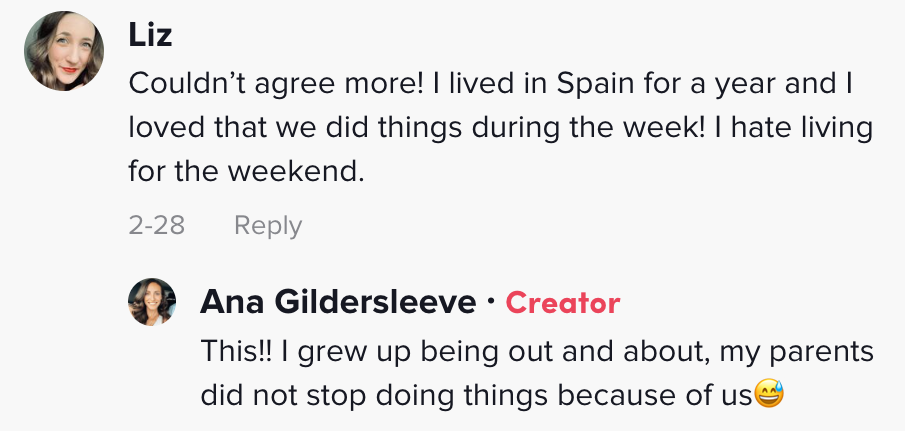
Others loved how "healthy" life in Spain sounded.

And many lamented Americans' stress related to work and how balancing parenting with socializing isn't easy in general due to our work/life balance.

When speaking to Ana about cultural differences she wishes Americans would try adopting from Spain to ease parenthood, she said, "I wish there was less judgment toward parents when bringing their kids in public. ... I keep seeing videos on social media from people saying that we should stop bringing children everywhere. One specific person left a comment [on] one of my videos that said, 'As a child-free person, please don’t bring your children everywhere to the adult activities, we don’t want them.' This is so sad to me because I come from a country that absolutely loves and respects kids."
Ana also feels like parents in the US receive harsher judgment, which can scare them away from any socializing that is not strictly child-oriented, like playgrounds. (Which, in turn, furthers the isolation.)
"If a kid has a tantrum, people don’t stare or look at the parents in a mean way. People understand that small kids sometimes have difficulty navigating emotions or that the kid simply does not have the words to express his or her feelings yet," she said. "However, I feel like in the US we expect kids to act like adults, but that is just impossible."
For Ana, she says that life in the US is made easier by her group of friends — her own, personal village. "It is so comforting to know that you are not alone," she said. And this small comfort could go a long way for everyone.
If you'd like to keep up with Ana, you can follow her on TikTok and Instagram.

